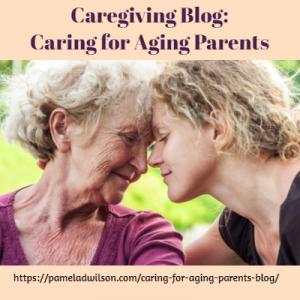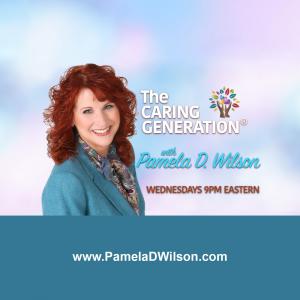Why Does Caregiving Become All-Consuming for Some Caregivers and Not Others?
Adult children start innocently helping elderly parents. Months or years later, they realize that their lives are consumed by caregiving responsibilities.
GOLDEN, CO, USA, January 6, 2021 /EINPresswire.com/ -- Adult children of all ages start innocently helping elderly parents. Months or years later, they realize that their lives are consumed by caregiving responsibilities that affect health, family relationships, careers, and the ability to earn income. Caregivers wonder, why does caregiving become all-consuming for some adult children and not others?
Caregiving expert Pamela D Wilson shares 10 Things Adult Children Caregivers Must Know About Caring for Parents in a recent Caring for Aging Parents Blog post. Wilson, a caregiver for her parents, started out like many caregivers as a helper for aging parents who passed away more than twenty years ago.
Today, she educates family caregivers, community groups, and workplaces by offering online caregiver courses, articles, videos, podcasts, and webinars. Her Caring for Aging Parents Blog and The Caring Generation® podcasts are popular with caregivers worldwide. She is also an engaging and entertaining caregiving speaker.
Taking care of parents is happening at younger and younger ages. Millennials are a significant part of the caregiving population, often caring for Baby Boomer parents who are single or divorced. Becoming a caregiver at an early age can derail young adults from a normal transition to adulthood that may include attending college, pursuing a career, marrying, and having children.
Caregivers, from age 20 to age 80, experience varying degrees of isolation and loneliness. For young adult caregivers, a lack of shared experiences creates a gap between indulging in 20 hours of fun each week versus 20 hours devoted to a parent's care.
Older caregivers, known as elderly taking care of the elderly, are adult children in their 70’s caring for elderly parents in their 90’s. These caregivers give up planned retirement activities for the duty and responsibility of caring for aging parents.
When caregivers lack information about available resources and programs, the time devoted to the care of parents can become all-consuming. A lack of discussion between adult children and elderly parents about the time devoted to caregiving places caregivers in a position of contributing more and more time.
Adult children trade time and significant parts of their lives to be a caregiver for parents. Many young caregivers experience chronic stress and develop health issues that follow them for a lifetime. Mid-life and older caregivers experience similar problems with health and suffer from physical disabilities.
Statistics from Stanford and other studies confirm that caregivers have a 60% higher mortality rate than non-caregivers and that 30-40% of caregivers die before the person for whom they care. One wonders why—at least in the United States—is more attention not given to elder care concerns?
Corporations support family care but not eldercare programs. Families instead of social values form the basis and the foundation to maintain that the lives of elderly family members have value. Sons and daughters dedicate time for the care of aging parents.
In the United States and throughout the world, the aging population is rising. The pandemic has reinforced aspects of the frail health of the elderly and greater susceptibility to infections and viruses.
The medical profession today is stretched to find candidates for geriatric programs. Family caregivers with little or no experience are becoming responsible for coordinating medical care and communication between primary care physicians and specialists. Caregivers express fear about making mistakes.
Because of gaps in the healthcare system, family caregivers will continue to bear more and more responsibility for at home and medical type care for parents. Successfully remaining at home, while a desire of older adults requires significant devotion and time from adult children or other family members.
Caregiver education and support groups remain an essential component of supporting family caregivers. Support for the emotional aspects of caregiving as well as managing the day-to-day care of parents can be accomplished more successfully when caregivers feel confident and supported.
Through gaining knowledge about available support programs and realizing the importance of self-care, caregivers can balance their lives with caregiving responsibilities. Caregivers who participate in education and support programs receive permission to make more effort to care for themselves and their families while supervising and arranging care for eldelry parents.
More information for family caregivers and elder care programs for the workplace, Wilson’s weekly radio program The Caring Generation®, her book The Caregiving Trap: Solutions for Life’s Unexpected Changes, and other programs is available by calling Wilson directly at 303-810-1816, emailing an inquiry to Inquiry_For_Pamela@PamelaDWilson.com, or visiting www.PamelaDWilson.com
P Dombrowski-Wilson
Pamela D. Wilson, Inc.
+1 303-810-1816
email us here
Visit us on social media:
Facebook
Twitter
LinkedIn
What to Do when It Takes More Than Love to Be a Caregiver
Legal Disclaimer:
EIN Presswire provides this news content "as is" without warranty of any kind. We do not accept any responsibility or liability for the accuracy, content, images, videos, licenses, completeness, legality, or reliability of the information contained in this article. If you have any complaints or copyright issues related to this article, kindly contact the author above.



